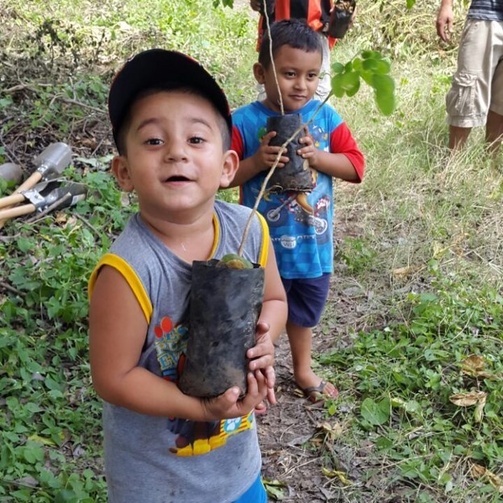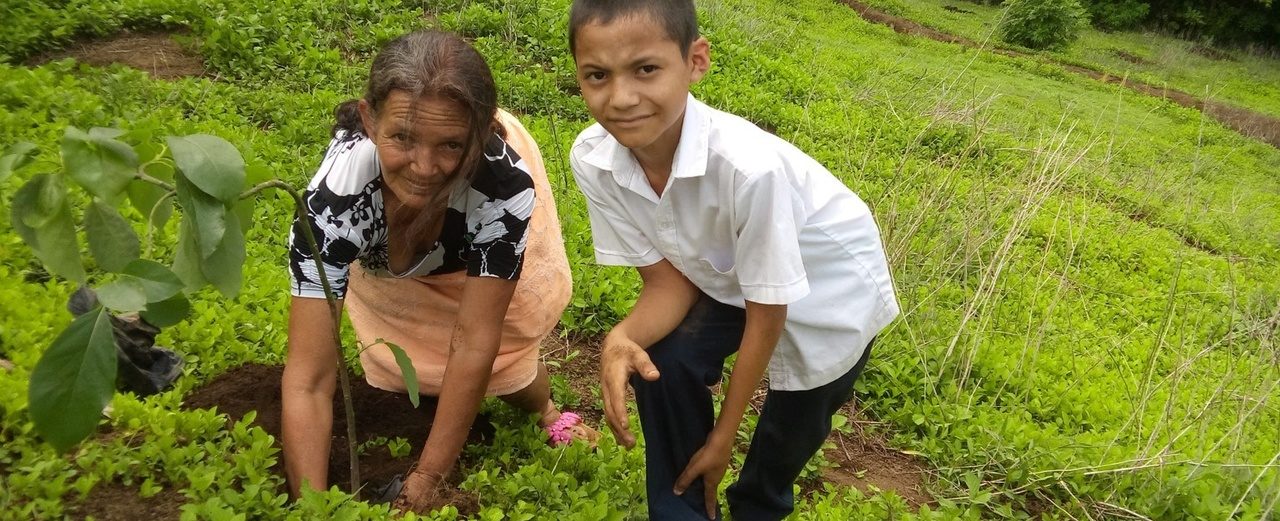 Water is life!
Water is life!
Planting trees to protect water sources
Without water there can be no life. This applies to nature as much as it does to people. El Salvador is a small Central American country with much more rainfall than Germany. But the water only reaches a few people. Those living in rural areas often suffer from a lack of water. For many years people have therefore been organising their own water supply: They build wells, water tanks and retention basins. That way they have at least some drinking water. But the home-made water systems are often inadequate: The shortage of water is currently increasing and is being exacerbated by climate change in particular. However, there is a very old and proven technique for increasing the water content in the soil: planting trees. In places with trees, the soil can better absorb rainwater and the water table can rise again. This is how to counteract the anticipated shortage of water.
Necessity
Tree seedlings for reforesting deforested counties around the headwaters.
Activity
Members of the community plant 30,000 trees to protect the surrounding water sources.
Countable effort
Number of trees that are planted by the local councils.
Result
The newly planted trees will grow and protect the water sources as well as helping to raise the water table.
Systemic effect
In the long run, water sources are protected and the members of the communities will have reliable access to water.
Background
El Salvador has an average annual rainfall of 70 inches (FAO, 2015). It is relatively a lot. But water is still a scarce resource in El Salvador. Not only does precipitation fall unevenly over the months, it is also distributed unevenly across the various regions of the country. At the same time, many trees are cut down to produce firewood. Due to the high rate of deforestation, less and less water is absorbed by the soil. This has several negative consequences: the water table drops, the natural water sources dwindle or, in the worst case, dry up completely. The problem is exacerbated by advancing climate change. In order to protect water sources, civil society organisations introduced a bill in 2006 aimed at sustainable water use and its fair distribution. However, the bill and other updated versions have not yet been passed by parliament. Currently, there is even a danger of an increasing privatisation of water in El Salvador. This would make the long-term protection of water sources even more difficult.
The good deed
Your donation and support will help reforest the headwaters of seven El Salvador counties, where local councils have established independent water systems to supply the population. The planting of 30,000 local and indigenous tree seedlings makes an important contribution to the reforestation and protection of these natural water sources. Since most of these are located in hilly or mountainous areas, the trees make a major contribution to ensuring that much more rainwater can be retained in the soil. As a result, the water table rises and the springs grow in strength. The reforestation benefits more than 40,000 people and at the same time contributes to the protection of the environment and forests.

AboutEl Salvador
San Salvador
6,400,000
6,868
Placed 121 of 189
In terms of size, El Salvador is the smallest country in Central America. On the other hand, it is the most densely populated and least forested.
About the organization and further information
INKOTA-netzwerk e.V.
Website


Further information and source
- UNESCO/UN Water, 2019. Weltwasserbericht der Vereinten Nationen 2019: Niemanden zurücklassen! (Deutsche Version, Zusammenfassung)
- Krämer, 2019. „Wir verteidigen unser Wasser“ - In El Salvador hat sich eine breite Bewegung gegen die vom Unternehmerverband forcierte Privatisierung der Wasserversorgung gebildet, in: Südlink 187 (März 2019), Seite 34.
- FAO, 2015. Informe Aquastat: Perfil de País – El Salvador.




